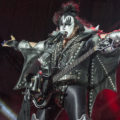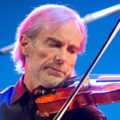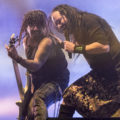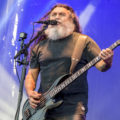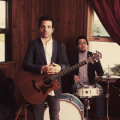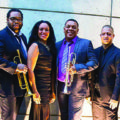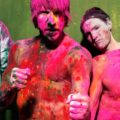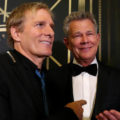From Germany to America, krautrock pioneers faUSt pound out “Fresh Air”
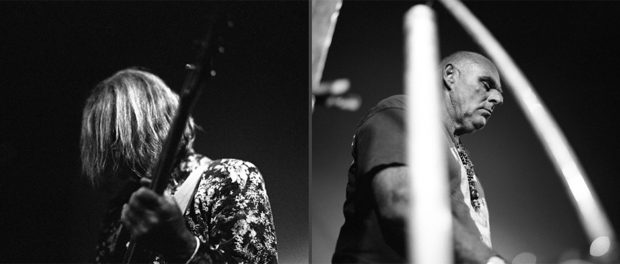 Photo provided by Glass Onyon PR
Photo provided by Glass Onyon PR
When the 1960s were giving way to the ‘70s, a movement was brewing in Germany that couldn’t quite fit in the browser bins for psychedelic rock, electronic, jazz improvisation, avant-garde or really anything exclusively. But toss them all in a blender with a splash of world beats, a dash of minimalism or practically any other experiment of sounds imaginable and the results were the affectionately coined “krautrock.”
From the moment of its formation at the turn of those decades, faUSt was an integral component of laying the groundwork for that entire scene (also shaped by Kraftwerk, Tangerine Dream, Can and others), though the group whose name means “fist” stood out with the brute force of banging on junk metal, revving up jack-hammers, playing pinball machines and a whole assortment of unconventional sonic assaults. That trend continues to this very day thanks to original member Jean-Hervé Péron (vocals, strings, wind, tools) and fellow co-founder Werner “Zappi” Diermaier (drums), who keep on striking anything in site throughout their latest album “Fresh Air” and plan to do the same on the upcoming “Vagabondages In North America” Tour.
Though the line-up is changing depending on the date, the Windy City gets JHP (who’s equally fascinating in conversation with Chicago Concert Reviews as he is a musician) with guests Bobby Conn (vocals, guitar), Monica BouBou (vocals, violin), Josh Johannpeter (drums), Amaury Cambuzat (guitar, vocals) and Tim Barnes (drums, sounds) when faUSt fills up The Empty Bottle on July 11.
 Walk us back to the early ‘70s music scene in Germany and what was going on when faUSt was getting started?
Walk us back to the early ‘70s music scene in Germany and what was going on when faUSt was getting started?
Jean-Hervé Péron: Europe was on fire! All values and structures- social, political, sexual, financial, familial- were cast away. Cobblestones flew at violent, repressive police forces. Factories were taken over by workers, universities were occupied by students and rioting professors. Philosophers and artists demonstrated in the streets of all major cities. The vacuum left after World War II had been hastily filled by the Marshall Plan. Fourteen billion dollars for the better of the industry, but for the worse of European culture. The young people lost their identity and received McDonald’s food, silk stockings, Lucky Strike cigarettes and rock n’ roll. Something had to be done. May ‘68: Krautrock!
You’ve often been cited as one of the very first krautrock acts. What’s your opinion of the term and did you realize you were at the forefront of such a movement or were you just going about pursuing your musical ambitions?
Péron: Faust was one among many other groups who wanted to break away from established forms of music and art in the ‘70s. We were persistent in our ideals, refused all compromises and were lucky to meet great people walking on the same path. But memories can be treacherous. As decades pass by, one’s visions of the past may become distorted, either through wishful thinking or simply because of a jam in one’s synapses. So, what I remember may not necessarily be what really happened.
Let’s take May 1968 as a time reference in our conversation and a historical turning point anyway. The social and political upheavals happening in Europe, the most spectacular ones in Paris where students and proletariat joined forces to throw cobblestones at the system, had a huge impact on the art world. The young generation, the one born in the ‘40s, reacted with all the enthusiasm inherent to youth. I believe artists are the mirrors and voices of any given political, social and economic situation. Now, the question is rather, what factors triggered the May ‘68 revolution? I believe in basic principles: pressure generates conflicts, vacuum generates creativity. Our generation was governed by former army generals. Our generation grew up amidst the ruins left after World War II. These are reasons enough to eagerly long for something different, if not better. New social structures, new political patterns and new approaches to art.
We were all in the same boat, surrounded by the same elements, exposed to the same forces. We were the children of a wasted generation. We ourselves did not actually witness the horrors of what went on from 1930-45. More so, we are now witnessing a similar situation of right-wing thinking, of intolerance, of racism. I don’t think we were conscious of what was happening in our minds at the time. It is only with hindsight and because that question has been asked to me so many times that I believe it was more the vacuum left behind by such destructive powers, which stimulated us to look for new ways, and also the natural impulse of the youth to cast away all norms and look for new ones. Krautrock was definitely a way of returning the joke on the English press who, in need of finding a hit term for all that weird music coming from the “krauts” came up with “krautrock.” I would attribute this word, maybe around 1972, to Simon Draper of Virgin Records. We thought, “you call this ‘krautrock,’ well, we are going to ‘krautrock’ you!” This piece is still the absolute favorite piece for the audience.
 How much camaraderie and/or competition did you feel with Kraftwerk?
How much camaraderie and/or competition did you feel with Kraftwerk?
Péron: I realized the existence of Kraftwerk very, very late. 2000-something. There has never been friendship, but also absolutely no competition between faUSt and Kraftwerk. We did not know that [they] existed. It is only very recently that I met [former Kraftwerk electronic percussionist] Karl Bartos and invited him to do an acoustic session with us. Karl peeled potatoes! Sounded great!
Why did the group take so much time off throughout the entire 1980s?
Péron: Time passes slowly when you are lost in a dream.
What prompted the reformation?
Péron: Being in a band is like a marriage bond. Faust got together in 1968- officially 1970- and since then the band had ups and downs. We went through many crises, but somehow we wanted to stay together. Yes, we had a long separation- 1980 to 1990 approximately- and finally got back together most probably because we missed one another. We missed the music. The reunion ended after the production of “You Know Faust” [in 1997] when Faust disbanded again, this time for good and lead to faUSt. Although the band now has two incarnations, we respect each other.
How does this second period of faUSt compare and contrast with the early years?
Péron: Physically a big difference. We are now only two original members: Zappi and JHP. That’s a big difference, but we are very pleased to have longtime friends with us like Amaury Cambuzat. Although Amaury has his own band Ulan Bator, I consider him as full member of faUSt. Maybe that is the biggest difference between Faust and faUSt. faUSt collaborates with friends whereas Faust did not. We seem to have more fun on stage.
Give us a glimpse of your latest project “Fresh Air” and bringing it to The Empty Bottle.
Péron: All of “Fresh Air” has been recorded in the USA. Some of it is live recordings of concerts, most of it studio recordings in Los Angeles at CalArts and Austin Studios. It was a great privilege to work in such perfect studios. Our concept was to collaborate with local artists: Juergen Engler (Die Krupps), Ulrich Krieger (Metal Machine), Barbara Manning, Tim Barnes, Braden Diotte and so many others. It was so much fun and so interesting to meet all those great musicians and it worked best. Those artist-friends threw all their energy in the project and the most difficult part of the production was the editing. We had too many good titles to fit in only one production. We produced a special edition too with a couple extra tracks and a fine artwork. We will bring all those goodies with us and sign them…We have performed at The Empty Bottle before and I know the stage isn’t too big. It will be packed!
Faust performs at The Empty Bottle on Jul. 11. For additional details, visit Faust-News.Blogspot.com and EmptyBottle.com.

